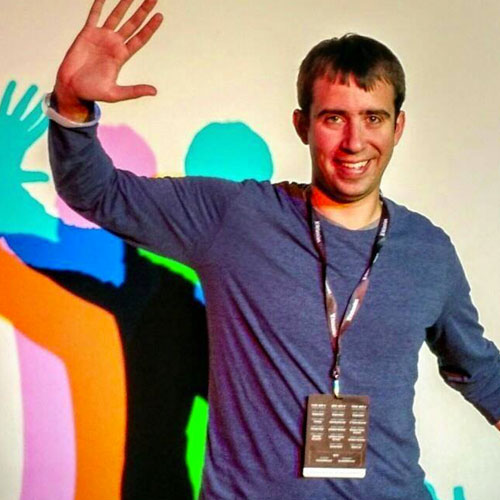EVENT AGENDA
Event times below are displayed in PT.

Mobile @Scale is an invitation-only technical conference for engineers building mobile software and services that serve millions or even billions of people. Engineering at this scale presents a set of complex, and often unprecedented challenges.
The @Scale community is focused on bringing people together to openly discuss these challenges and collaborate on the development of new solutions.
Join experts from Facebook, Google, Hopper, Instagram, Raizlabs, Runkeeper, TripAdvisor, Vesper, Wayfair and WhatsApp to openly discuss these challenges and collaborate on the development of new solutions.
Event times below are displayed in PT.
Rich co-founded Android and is a serial entrepreneur and serial VC with over 30 years of experience growing businesses on the leading edge of communications and user experience. Rich has been at Google since they acquired Android almost 12 years ago. His initial focus at Google was helping to build, launch and drive adoption for Android. Rich then was a founding partner at Google Ventures growing GV into a world class venture fund. Prior to Android, Rich started Wildfire Communications, the first voice based personal assistant and precursor to products like Siri, Amazon Echo and Google Home. Wildfire was acquired by Orange, the European mobile phone company where as a VP, Rich built and launched a number of innovative products and services, including early smart phones. Most recently Rich has been back at Google in start-up mode with a few passion projects. He received his Ph.D. in computer science from the University of Massachusetts at Lowell.

This talk will give a sneak peak of how WhatsApp is collaborating with Facebook's engineers to leverage Facebook's infrastructure to serve its users. I'll talk about how WhatsApp media service continues to maintain privacy and high service reliability while migrating to Facebook's data centers and is on a path to becoming even more performant by intelligently serving data from Edge POPs and offnet caches (ISP level) from around the world.

Every company wants to build a product that's great. But how do you do it? This session will cover what it takes to build world class products from design, development, and product management standpoints. We'll discuss how to push beyond features to support people and their habits, as well as how great products shape business models.

The Facebook UI Foundation team develops UI rendering infrastructure for common surfaces in the Facebook app. We recently migrated the Facebook Android News Feed codebase to background rendering in a scalable, safe, and performant manner. This talk will introduce how our teams completed this migration utilizing two open source libraries – Litho, a declarative UI Framework, and Infer, an analyzer which automatically finds concurrency bugs (and other bugs too!). We'll share some of the issues we ran into, performance results, and how you too can use these libraries in your own app.

Following the emergence of modern JS libraries in the early 2010s, server-side rendering was pushed back from being a primary concern in many web applications to no longer existing as a product requirement. In this talk, I’ll explore the decisions that pushed server-side rendering to the backburner, and the reasons that many development teams are revisiting this capability. Today teams can add in server-side rendering to their web applications for little additional cost, while gaining a huge amount of flexibility in how they speed up and simplify their applications. I’ll walk through some learnings my 300-person team has faced in converting a complex web application with millions of lines each of PHP and JavaScript to using server-side-rendered React. Attendees will also walk away with exposure to some of the wonderful modern tools now available to enable these capabilities.

How fast do you know when there's a problem in your latest version of your app? At Fabric, we built real-time analytics that supports billions of devices. In this talk, I'll detail how we scale analytics for many apps on nearly every device on the planet to make it easy for any developer to assess the health of their mobile application. First, I'll talk about our mobile SDK and techniques we use to ensure your mobile applications avoid DDOSing the internet. Second, I'll talk about how our real-time processing pipeline aggregates data from billions of devices in real-time without impacting accuracy. This talk will discuss our experiences with a lambda-architecture and our use of probabilistic data structures.

Runkeeper has a community of 60 million runners all around the world. Joe and Steve will take you through the journey of scaling the Runkeeper mobile app and back-end platform. Highlighting the key lessons learned along the way and some of the techniques and technology used to develop and deliver Runkeeper's services and features in a fast-moving and highly competitive industry.


The ability to prefetch data while your app is on background is a step taken towards decoupling the usability of your app from network availability. Moreover, it can minimize cellular data usage and significantly increase perceived speed. This talk walks through the main technical and performance challenges of the implementation. How do you schedule data prefetching on background? What framework is the most appropriate to execute this type of work? What should you be prefetching and when? Find out here.

How fast does a new feature go from inception to check-in to a user's device? How about with dozens of teams committing to a single repository at the same time? At Facebook, we are constantly working on reducing that time @ scale. This talk will cover the development process of Android engineers at Facebook and share some of the tools and infrastructure we have in place to ship fast and ship often.

How Piezoelectric material enabled zero power voice recognition and scaling these microphones to huge volumes (100s of Millions).

Recommendations is a new product at Facebook that empowers people to ask their friends and groups for things to do, places to eat, professional services and more. As we built new features, we encountered several interesting scaling problems. In this talk we'll share more about the technology challenges that emerged and our approach to solving these challenges.


For modern mobile apps, speed wins. A smooth user interface, resilience to spotty network connections, and quick startup time are mandatory to keep users engaged. Come hear how TripAdvisor instrumented its app to find bottlenecks, re-architected it with performance in mind, and proactively keeps performance from regressing.


As mobile apps grow in size and technical complexity, the effort of managing the level of strain on mobile phone resources becomes an even greater engineering challenge – particularly given the limited level of os-level access apps have on mobile phones. In this presentation we'll share insights into our process for reducing battery consumption by the Facebook family of applications on both Android and iOS including: the main causes of battery drain (everything from radio wake-ups to invisible animations), instrumenting and modeling battery drain (without relying on the OS reported battery level), and general best practices for reducing battery consumption by an app.



Air travel, mass tourism and modern computing share a common history, from the mainframes of the 1960s to the launch of the Web in the mid-1990s. But the business of travel has only begun to adapt to a new era of big data and small devices. In this session, we’ll talk about how Hopper has developed an app to empower consumers with mobile technology and big data analytics in an industry whose systems came of age more than 50 years ago.
















Kunal Bhalla is a software engineer working on improving the developer experience for ML... read more



